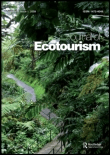
JOURNAL OF ECOTOURISM
Scope & Guideline
Advancing sustainable travel through scholarly insights.
Introduction
Aims and Scopes
- Ecotourism Development and Management:
Research on sustainable practices, business models, and management strategies for ecotourism that enhance conservation efforts while providing economic benefits to local communities. - Tourist Behavior and Environmental Attitudes:
Exploration of how tourists’ behaviors, motivations, and attitudes towards the environment influence their participation in ecotourism activities. - Community Involvement and Social Impacts:
Studies focusing on the role of local communities in ecotourism, including their participation, benefits, and the social dynamics involved in ecotourism initiatives. - Conservation and Biodiversity:
Investigations into the impacts of ecotourism on wildlife and ecosystems, including the effectiveness of ecotourism as a conservation tool. - Technology and Innovation in Ecotourism:
Examination of how advancements in technology, such as virtual reality and social media, influence ecotourism experiences and promote sustainable practices.
Trending and Emerging
- Pro-Environmental Tourist Behavior:
Increasing focus on understanding how tourists' pro-environmental behaviors can be influenced by ecotourism design and experiences, particularly among younger generations. - Community-Based Ecotourism:
A significant trend towards researching community-based ecotourism models that empower local communities and enhance their role in conservation efforts. - Integration of Technology in Ecotourism:
Emerging studies exploring the role of technology, including augmented reality and social media, in enhancing ecotourism experiences and promoting sustainable practices. - Resilience and Recovery Post-COVID-19:
Research focusing on the resilience of ecotourism in the wake of the COVID-19 pandemic, including strategies for sustainable recovery and adaptation to new realities. - Animal Welfare and Ethical Tourism:
Growing emphasis on animal welfare within ecotourism, reflecting a broader societal concern for ethical tourism practices and the treatment of wildlife.
Declining or Waning
- Traditional Wildlife Tourism:
Research focusing solely on traditional wildlife viewing experiences is less prevalent, indicating a shift towards more integrated and community-focused approaches to wildlife tourism. - Economic Impact Studies:
While economic studies remain important, there appears to be a waning focus on purely quantitative analyses of economic impacts, with a growing preference for qualitative insights and holistic assessments. - Overemphasis on Visitor Satisfaction Surveys:
Although visitor satisfaction remains relevant, there is a noticeable decline in studies that rely heavily on satisfaction surveys without considering broader ecological and community impacts. - Static Conservation Models:
The journal is moving away from static models of conservation that do not adapt to changing environmental conditions or community needs, favoring dynamic frameworks that incorporate resilience and adaptability.
Similar Journals
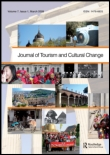
Journal of Tourism and Cultural Change
Innovating Research at the Crossroads of Tourism and SocietyThe Journal of Tourism and Cultural Change, published by Routledge Journals, Taylor & Francis Ltd, stands as a leading scholarly resource within the intersecting realms of tourism, cultural studies, and environmental science. With its ISSN 1476-6825 and E-ISSN 1747-7654, this journal reflects a remarkable legacy since its inception in 2003, maintaining a strong commitment to advancing interdisciplinary research through 2024. Currently ranking in the Q1 category for Cultural Studies and Geography, Planning and Development, and having a commendable Scopus ranking that places it in the top 97th percentile across various relevant categories, the journal is crucial for academics and practitioners alike seeking to explore and understand the dynamics of culture in the context of tourism. The Journal of Tourism and Cultural Change emphasizes high-quality research that informs policy and practice, making it indispensable for scholars, industry professionals, and students dedicated to these evolving fields. Although this journal does not currently offer Open Access options, its contributions are invaluable in fostering dialogue on sustainable tourism, cultural heritage, and the socio-economic implications of travel in our connecting world.
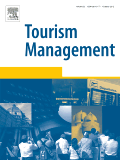
Tourism Management
Leading Insights for Leisure and Hospitality ProfessionalsTourism Management, published by Elsevier Science Ltd, is a leading peer-reviewed journal that serves as a vital platform for researchers, practitioners, and academics in the fields of tourism, leisure, and hospitality management. With a rich history dating from 1982 and an impressive impact factor reflective of its commitment to excellence, the journal is recognized as a Q1 ranked journal across multiple categories in the prestigious Scopus database, affirming its influence and relevance. As the journal embarks on its convergence towards 2025, it continues to address the ever-evolving challenges and opportunities within the tourism sector, offering scholarly articles that provide insights into development strategies, effective management practices, and innovative solutions in transportation and hospitality. Though it currently operates under a traditional publishing model, Tourism Management remains dedicated to advancing knowledge and fostering discourse among its diverse readership, making it an essential resource for anyone seeking to deepen their understanding of this dynamic field.
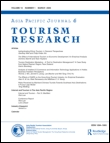
Asia Pacific Journal of Tourism Research
Connecting Research and Practice in TourismAsia Pacific Journal of Tourism Research is a premier academic journal dedicated to advancing knowledge in the fields of tourism, leisure, and hospitality management. Published by ROUTLEDGE JOURNALS, TAYLOR & FRANCIS LTD, and based in the United Kingdom, this journal has established itself as a leading voice in research ranging from sustainable tourism practices to the socio-economic impacts of travel in the Asia Pacific region. With an impressive Q1 ranking in both Geography and Tourism categories for 2023, it boasts a Scopus rank of #77 out of 821 in Geography and #32 out of 146 in Tourism, emphasizing its critical role in the academic community. Researchers, professionals, and students can benefit from its insights and findings, making it an essential resource for anyone involved in the tourism sector. The journal's commitment to fostering innovative research contributes significantly to our understanding of tourism dynamics from 2003 to 2024 and beyond.
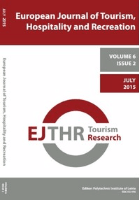
European Journal of Tourism Hospitality and Recreation
Connecting Research and Practice in European TourismThe European Journal of Tourism, Hospitality and Recreation, published by SCIENDO, stands as a prominent platform dedicated to advancing the fields of tourism and hospitality management, alongside recreational studies. With an ISSN of 2182-4924 and an E-ISSN of 2182-4916, this journal aims to foster a deeper understanding of the dynamic interactions between tourism, hospitality, and recreational activities from a multidisciplinary perspective. It welcomes contributions that explore theoretical frameworks, empirical studies, and innovative practices that address contemporary challenges within these sectors. The journal is strategically located in Warsaw, Poland, serving as a crucial resource for researchers, professionals, and students looking to stay abreast of the latest developments and research trends. Its commitment to quality is reflected in its accessibility, designed to support knowledge dissemination and professional growth in tourism and hospitality industries.

Journal of Heritage Tourism
Uncovering the Stories Behind Every DestinationJournal of Heritage Tourism, published by Routledge Journals, part of Taylor & Francis Ltd, is a leading peer-reviewed journal dedicated to the interdisciplinary study of heritage tourism. As a vital resource for researchers, professionals, and students in the fields of History and Tourism, Leisure and Hospitality Management, this journal has consistently achieved high rankings, securing a Q1 quartile in History and Q2 in Tourism for 2023. With an impressive Scopus rank of #3 out of 1760 in Arts and Humanities - History and #42 out of 146 in Business - Tourism, it underscores the journal’s importance and relevance in contemporary scholarship. Spanning contributions from 2006 to 2024, the journal provides a platform for innovative research, critical discussions, and comprehensive analyses, fostering a greater understanding of the complex relationships between heritage and tourism. Although it does not currently offer open access, insights published within this journal remain accessible for institutional libraries and academic communities worldwide, ensuring that the ongoing discourse around heritage tourism flourishes.
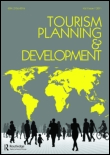
Tourism Planning & Development
Innovating pathways for responsible tourism planning.Tourism Planning & Development is a leading academic journal published by Routledge Journals, Taylor & Francis Ltd, focusing on the intersection of tourism, sustainable development, and strategic planning. With an ISSN of 2156-8316 and an E-ISSN of 2156-8324, this journal serves as an essential resource for researchers, professionals, and students engaged in the fields of Business, International Management, and Tourism. With a notable impact factor indicated by its placement in Q1 and Q2 quartiles across key categories for 2023, it reflects significant influence and quality within its disciplines. The journal's scope covers groundbreaking research from 2011 to 2024, ensuring a comprehensive exploration of contemporary issues in tourism planning and its developmental implications. Located in the United Kingdom, the journal's commitment to advancing knowledge in tourism and sustainable practices makes it a valuable platform for scholarly discussions and innovation.
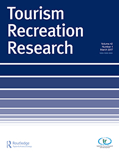
Tourism Recreation Research
Illuminating the Pathways of Tourism and RecreationTourism Recreation Research is a prestigious academic journal that provides an essential platform for the dissemination of cutting-edge research in the fields of tourism, recreation, and cultural studies. Published by Routledge Journals, Taylor & Francis Ltd, this journal stands out with its commendable performance, achieving a Q1 ranking in several categories, including Cultural Studies, Geography, Planning and Development, and Management, Monitoring, Policy and Law, as well as a Q2 ranking in Tourism, Leisure, and Hospitality Management. With an extensive publication history converging from 1976 to 2024, the journal emphasizes high-quality, empirical research, making it a crucial resource for scholars, policy makers, and industry professionals alike. While it is not an open-access journal, it offers a wide range of subscription and access options to facilitate research and learning. The journal’s outstanding Scopus rankings further attest to its academic influence, ranking in the top 99th percentile in Cultural Studies and maintaining a notable presence in a variety of related fields. Engaging with Tourism Recreation Research enables readers to stay at the forefront of evolving discussions and practices within the tourism and recreation sectors.
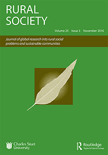
Rural Society
Connecting Research, Policy, and Rural InnovationRural Society, published by Routledge Journals, Taylor & Francis Ltd, is a prominent academic journal dedicated to exploring the complexities and dynamism of rural communities. Since its inception in 1991, the journal has served as a critical platform for advancing interdisciplinary research in the fields of tourism, leisure, and hospitality management, particularly in the context of rural societies. With an ISSN of 1037-1656 and an E-ISSN of 2204-0536, Rural Society has carved out a niche within the Q3 category of Scopus rankings, reflecting its commitment to high-quality research despite its positioning in the 26th percentile among its peers. This journal is vital for researchers, practitioners, and students alike, offering valuable insights into sustainable practices, social dynamics, and economic development within rural settings. While it does not currently offer open access, Rural Society continues to foster academic dialogue and innovation, providing readers with access to crucial findings that directly inform policies and practices impacting rural life.
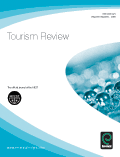
Tourism Review
Shaping the future of tourism through rigorous research.Tourism Review, published by Emerald Group Publishing Ltd, stands as a premier academic journal dedicated to advancing the field of tourism studies, with an impressive focus on geography, planning, and development. This journal, which has been contributing to the academic community since 2001, is ranked in the top quartile (Q1) for both Geography, Planning and Development and Tourism, Leisure and Hospitality Management, reflecting its significant impact and authority in the sector. With an exceptional standing in Scopus rankings—14th out of 821 in Social Sciences and 15th out of 146 in Business, Management, and Accounting—Tourism Review provides rigorous, peer-reviewed research that is essential for scholars, practitioners, and students engaged with contemporary tourism issues. This journal serves as a crucial platform for disseminating knowledge and fostering innovative solutions within the tourism sector, thereby contributing to sustainable development and enriching the experience of travelers worldwide. Although not an open-access journal, it offers valuable insights and comprehensive research suitable for those who wish to deepen their understanding of tourism dynamics.
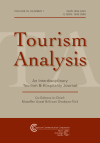
Tourism Analysis
Navigating Complexities in Leisure and Hospitality Management.Tourism Analysis, published by COGNIZANT COMMUNICATION CORP, is a pivotal journal in the field of Tourism, Leisure, and Hospitality Management. With a dedicated focus on the complexities and dynamics of the tourism industry, the journal has been a crucial platform for sharing innovative research since its inception in 2001. The journal is recognized within Scopus rankings, holding a respectable position in the 39th percentile among its peers, reflecting its value in scholarly communication. Although it does not currently operate as an Open Access journal, Tourism Analysis provides access to a wealth of insights and studies that cater to academic researchers, industry professionals, and students striving to enhance their understanding of tourism trends and impacts. With its commitment to rigorous peer review and diverse contributions, the journal plays a significant role in advancing knowledge and fostering discussions in the rapidly-evolving tourism sector.